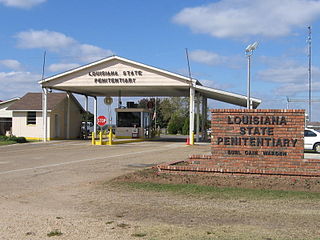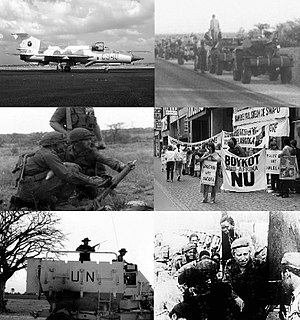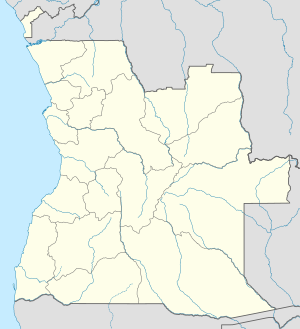
Angola, officially the Republic of Angola, is a west-coast country of south-central Africa. It is the seventh-largest country in Africa, bordered by Namibia to the south, the Democratic Republic of the Congo to the north, Zambia to the east, and the Atlantic Ocean to the west. Angola has an exclave province, the province of Cabinda that borders the Republic of the Congo and the Democratic Republic of the Congo. The capital and largest city of Angola is Luanda.
The Economy of Angola is one of the fastest-growing in the world, with reported annual average GDP growth of 11.1 percent from 2001 to 2010. It is still recovering from 27 years of the civil war that plagued the country from its independence in 1975 to 2002. Despite extensive oil and gas resources, diamonds, hydroelectric potential, and rich agricultural land, Angola remains poor, and a third of the population relies on subsistence agriculture. Since 2002, when the 27-year civil war ended, the nation has worked to repair and improve ravaged infrastructure and weakened political and social institutions. High international oil prices and rising oil production have contributed to the very strong economic growth since 1998, but corruption and public-sector mismanagement remain, particularly in the oil sector, which accounts for over 50 percent of GDP, over 90 percent of export revenue, and over 80 percent of government revenue.

Luanda, formerly named São Paulo da Assunção de Loanda, is the capital and largest city in Angola, It is Angola's primary port, and its major industrial, cultural and urban centre. Located on Angola's northern coast with the Atlantic Ocean, Luanda is both Angola's chief seaport and its administrative centre. It is also the capital city of Luanda Province. Luanda and its metropolitan area is the most populous Portuguese-speaking capital city in the world, with over 8 million inhabitants in 2019. Among the oldest colonial cities of Africa, it was founded in January 1576 by Portuguese explorer Paulo Dias de Novais, under the name of São Paulo da Assunção de Loanda. The city served as the centre of the slave trade to Brazil before its prohibition. At the start of the Angolan Civil War in 1975, most of the white Portuguese left as refugees, principally for Portugal. Luanda's population increased greatly from refugees fleeing the war, but its infrastructure was inadequate to handle the increase. This also caused the exacerbation of slums, or musseques, around Luanda. The city is currently undergoing a major reconstruction, with many large developments taking place that will alter its cityscape significantly.

Cabinda is an exclave and province of Angola, a status that has been disputed by several political organizations in the territory. The capital city is also called Cabinda. The province is divided into four municipalities—Belize, Buco-Zau, Cabinda and Cacongo.

The National Union for the Total Independence of Angola is the second-largest political party in Angola. Founded in 1966, UNITA fought alongside the Popular Movement for the Liberation of Angola (MPLA) in the Angolan War for Independence (1961–1975) and then against the MPLA in the ensuing civil war (1975–2002). The war was one of the most prominent Cold War proxy wars, with UNITA receiving military aid from the United States and South Africa while the MPLA received support from the Soviet Union and its allies.

The People's Movement for the Liberation of Angola, for some years called the People's Movement for the Liberation of Angola – Labour Party, is a political party that has ruled Angola since the country's independence from Portugal in 1975. The MPLA fought against the Portuguese army in the Angolan War of Independence of 1961–74, and defeated the National Union for the Total Independence of Angola (UNITA) and the National Liberation Front of Angola (FNLA), two other anti-colonial movements, in the Angolan Civil War of 1975–2002.

The President of the Republic of Angola is both head of state and head of government in Angola. According to the constitution adopted in 2010, the post of Prime Minister is abolished; executive authority belongs to the President who has also a degree of legislative powers, as he can govern by decree.

José Eduardo dos Santos is an Angolan politician who served as President of Angola from 1979 to 2017. As President, José Eduardo dos Santos was also the commander in chief of the Angolan Armed Forces (FAA) and President of the People's Movement for the Liberation of Angola (MPLA), the party that has ruled Angola since it gained independence in 1975. He was the second-longest-serving president in Africa, surpassed only by President Teodoro Obiang Nguema Mbasogo of Equatorial Guinea, who took power less than two months before dos Santos.

Angola is divided into eighteen provinces, known in Portuguese as províncias:

The Angolan War of Independence (1961–1974) began as an uprising against forced cultivation of cotton, and it became a multi-faction struggle for the control of Portugal's overseas province of Angola among three nationalist movements and a separatist movement. The war ended when a leftist military coup in Lisbon in April 1974 overthrew Portugal's Estado Novo regime, and the new regime immediately stopped all military action in the African colonies, declaring its intention to grant them independence without delay.

The Louisiana State Penitentiary is a maximum-security prison farm in Louisiana operated by the Louisiana Department of Public Safety & Corrections. It is named "Angola" after the former plantation that occupied this territory. The plantation was named for the African country that was the origin of many slaves brought to Louisiana.
The Angola national football team, nicknamed Palancas Negras , represents Angola in international football and is controlled by the Angolan Football Federation, the governing body of association football in the country.

TAAG Angola Airlines E.P. is the state-owned national airline of Angola. Based in Luanda, the airline operates an all-Boeing fleet on domestic services within Angola, medium-haul services in Africa and long-haul services to Brazil, Cuba, China, and Portugal. The airline was originally set up by the government as DTA – Divisão dos Transportes Aéreos in 1938, rechristened TAAG Angola Airlines in 1973, and gained flag carrier status in 1975. It is now a member of both the International Air Transport Association and the African Airlines Association.

The Angolan Civil War was a civil war in Angola, beginning in 1975 and continuing, with interludes, until 2002. The war began immediately after Angola became independent from Portugal in November 1975. The war was a power struggle between two former liberation movements, the communist People's Movement for the Liberation of Angola (MPLA) and the anti-communist National Union for the Total Independence of Angola (UNITA). The war was used as a surrogate battleground for the Cold War by rival states such as the Soviet Union, Cuba, South Africa and the United States.

The South African Border War, also known as the Namibian War of Independence, and sometimes denoted in South Africa as the Angolan Bush War, was a largely asymmetric conflict that occurred in Namibia, Zambia, and Angola from 26 August 1966 to 21 March 1990. It was fought between the South African Defence Force (SADF) and the People's Liberation Army of Namibia (PLAN), an armed wing of the South West African People's Organisation (SWAPO). The South African Border War resulted in some of the largest battles on the African continent since World War II and was closely intertwined with the Angolan Civil War.
The Angolan national basketball team is controlled by the Federação Angolana de Basquetebol. Angola has been a member of FIBA since 1979. Ranking 23rd in the FIBA World Rankings, Angola is the top team of FIBA Africa, and a regular competitor at the Summer Olympic Games and the FIBA World Cup.

Miss Angola is a national beauty pageant in Angola. The pageant was founded in 1997, and has sent its winners to Miss Universe since its foundation. From 1998 to 2012, its first runners-up were sent to Miss World.

The People's Republic of Angola was the self-declared socialist state which governed Angola from its independence in 1975 until 1992, during the Angolan Civil War.

Portuguese Angola refers to Angola during the historic period when it was a territory under Portuguese rule in southwestern Africa. In the same context, it was known until 1951 as Portuguese West Africa.


















